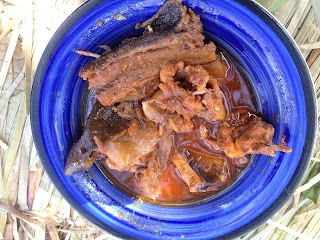KALITE FARM ECO-AGRITOURISM, PRESERVE HAITIAN CULTURE AND THE ENVIRONMENT:
The
benefits of Eco-Agritourism is a safe way for rural communities to preserve
their distinctive cultural and natural heritage. Kalite Farm will support the
efforts of all the small businesses and individuals working on action programs
to preserve Haitian heritage, we will formed a network of farmers, artisan,
historians, agronomist and many other residents to collaborate on a range of
dynamic educational programs than can help sustain communities, encourage
expansion of agriculture and provide an extraordinary visitor experience
Introduction
Kalite
Farm is blessed with a fascinating history spanning from the Arawak tribe to
the modern day, natural beauty, history and healthy food choices, both wild and
cultivated. There is much to discover and enjoy. There is also much to protect.
Beyond the seaside Farm/B&B are people preserving their heritage
(sustainable farmers, artisan bread bakers, chair makers, beekeepers, and many
others). They are maintaining what most of us have lost touch with – a
connection between themselves, their community and nature. Their knowledge of
sustainable living practices is beneficial to the global community. Many people
around the world are “return to the
land,” while many people in rural Haiti have never left the land. But modern
society beckons and rural communities are abandoned or developed.
Methods
Kalite
Farm will introduces visitors to residents who maintains their small family
much like their ancestors, using sustainable methods of living. Local food from
the community sources and wild plants are used in cooking and natural medicine,
which we discover during hikes in the countryside and cooking demonstrations.
Both residents and visitors benefit from community-based
preservation programs. Careful consideration and strong alliances are required
to sustain these concept. Residents are investing their time and money to share
valuable knowledge. Our B&B offer visitors a rare opportunity to discover
the heart of Haiti and obtain information that can enrich their lives.
The majority of tourism planners support generic services, such as
large beach resorts and continental food. Most operations are of little benefit
to local communities in terms of providing financial stability or protecting
Haiti’s cultural and natural heritage. More than 70% of Haitian’s residents are
still involved in small scale agriculture – primarily sugar cane, cashew,
mango, orange, rice, cocoa, coffee, sweet potato and a variety of other vegetable
on a part-time basis. Both industries compete for increasingly scarce natural
resources, commonly referred to as “the war on water.” Kalite Farm promotes the
benefits of educational travel via the window of traditional food and artisanal
ways.
Implementing Responsible Travel in the Case of
Eco-Agritourism
The fact that a destination has excellent cuisine and nature
reserves does not mean that communities are able to open up the area to
visitors. Before residents invite visitors to their villages and farms, they
need to consider how they will present and sustain their programs and protect
their communities.
Since most of us are not farmers, we don’t know what to expect
from an agritourism experience. Agritourism is meant to support farmers, their
communities and also helps to protect our environment.
REMEMBER: The time local devote to sharing their knowledge with us
is a rare privilege.
Responsible travel covers a lot of ground today. The bottom line
is that people are actively working to support and protect the communities in
which they live, work or visit. Responsible travel is part of the solution to a
growing number of global issues relating to social inequality, exploitation,
cultural preservation, food safety and environmental protection. Many people
say they prefer “real” or “ethical” travel experiences, yet they are unaware
that local communities must justly benefit from the services they provide.
Promoting Responsible Travel
As with all market trends, travel providers offering alternative
forms of tourism in an unethical manner is damaging to authentic travel
experience. As long as the majority of media and travel agencies send the
message that “cheap travel deals are the way of the world,” people will not be
aware of the true cost of travel, including the environmental and social impact
that travel has on communities or the true cost of safe food. The majority of
travel agencies are not yet trained in ethical-travel practices.
Mass media rarely covers
small-scale programs because there is no apparent benefit to them. Discount
deals cut in mega travel cannot be cut in rural communities. Most media outlets
expect free food and lodging, consultancy and entertainment. Small-scale
practitioners cannot afford this form of advertising, nor are they certain to
benefit from it, as the coverage is rarely specific to their work and could be
subjective.
The first step to launch a small-scale program is from the ground
up in collaboration with advocacy groups and public agencies, if possible.
Responsible travel is not a trend; it is a necessity.
Conclusion
Responsible travel, in the case of Eco-Agritourism, provides a
wide range of benefits to communities and visitors. It provides an opportunity
for entrepreneurs and travelers to be active participants in sustainable-development
programs. Responsible travel can help preserve our world’s sanctuaries and even
reverse some damage caused by unsustainable development. It can build
meaningful careers for future generations and protect the very reason why people
visit countries like Haiti– to discover her significant cultural legacy and
natural beauty.












































